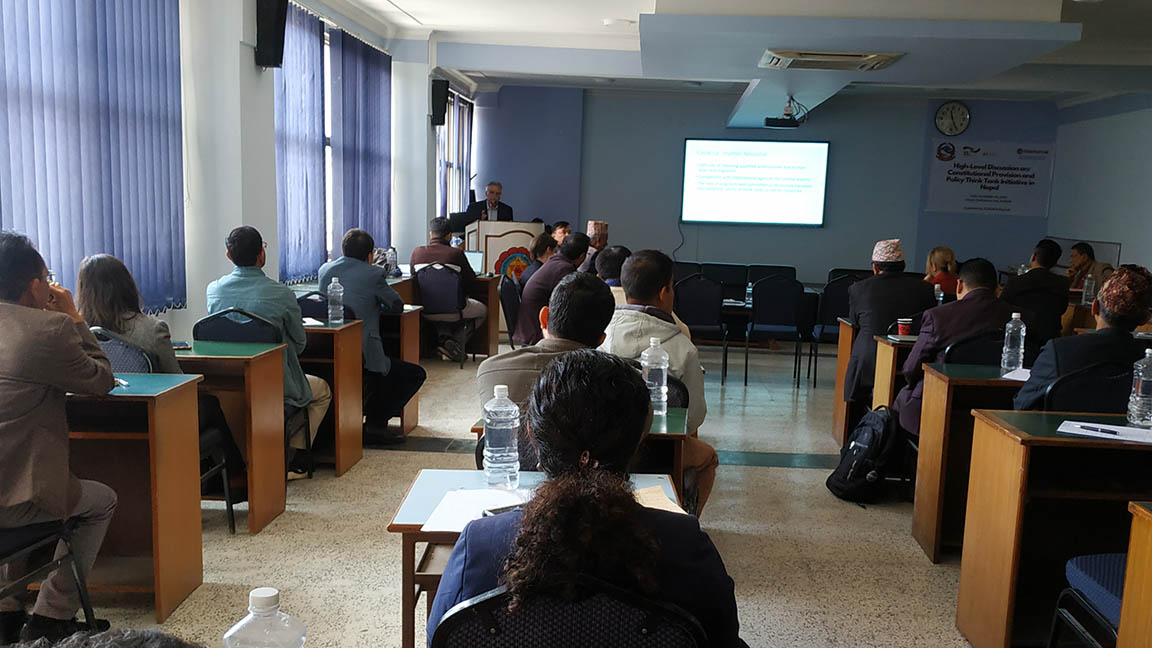

Giving Voice to Displaced People with Disabilities through Higher Education Rights Advocacy
December 3, 2023
dev datta joshi, IIE Centennial Fellow 2022-2023
IIE selected Dev Datta Joshi as a 2022-2023 IIE Centennial Fellow to continue his work advocating for persons with disabilities and particularly the challenges faced by refugees with disabilities. Through educating those with disabilities, policymakers, and university deans, he hopes to increase education opportunities for refugees with disabilities.
The right of refugee and displaced persons with disabilities to be included in mainstream higher education institutions is enshrined in Nepal’s 2015 Constitution and multiple international conventions. This clearly recognized right holds that refugees with disabilities should have opportuniites to inclusive quality higher education (HE). However, in Nepal, refugee and displaced people with disabilities continue to be excluded from higher education opportunities.
Despite broad legal recognition, in Nepal, university-age refugees with disabilities, especially Rohingya refugee women with disabilities, are largely unable to attend higher education institutions. Rohingya refugees with disabilities struggle to assert their right to education where educational access may be hindered by system constraints, resource limitations and negative attitudes. Disabled refugees have been invisible in policy and service provision, reliable data is extremely limited, and there has been little research into their experiences of educational inclusion and exclusion.
Fellowship Impact
My Centennial Fellowship project has actively worked to increase access, ensure equity, provide pathways, and address needs related to higher education attainment for refugee and displaced populations by:
- Holding advocacy and policy dialogues on issues related to refugee equality and empowerment, especially disability-inclusive education, with university deans and education policymakers to further advance this initiative.
- Educating and equipping representatives from Disabled Peoples’ Organizations, university staff, local governments, policymakers, human rights defenders and police officers with the insights and skills needed to ensure higher education attainment for refugee and displaced populations.
- Expanding policymakers’ knowledge of disabled refugee and displaced persons’ educational rights as enshrined in Nepal’s Constitution and international human rights instruments.
- Addressing and working to minimize stereotypes prevalent in Nepalese communities about disabled refugees’ capabilities that prevent them from exercising their right to higher education.
Collaboration is the only way we can tackle the huge global challenges we face. Trying to combat these in isolation guarantees failure. It is so important to collaborate and meet with people that think differently or come with from different backgrounds. For me, the Institute of International Education (IIE) Centennial Fellowship is like a rehearsal for real life, and I have enhanced my capabilities and skillset to confront and fix these huge problems.
From this fellowship, I have developed knowledge and skills on writing opinion pieces (op-eds) to promote the UN Refugee Agency (UNHCR) target of at least 15% Refugee HE enrollment by 2030.
Additionally, the IIE Centennial Fellowship provided me with the opportunity to craft persuasive arguments for policymakers and effectively communicate ideas with the general public.
Sustainability
To ensure the sustainability of the project’s impact, collaborating with Equip for Equality Nepal (EEN) – an organization devoted for the promotion of democracy and human rights in Nepal that I direct – I will:
- work with project participants (refugees with disabilities) to make sure the activity design is closely related to participants’ ongoing work, so they can integrate the project outputs into their daily work;
- follow up with participants to provide necessary support and examine newly raised needs;
- involve participants in future similar initiatives of the implementing agency where they can continually learn and stay motivated;
- produce and update training materials and other easily accessible resources that in a timely fashion;
- establish a network among participants so they can be each other’s resources throughout and beyond the project. We will establish online messaging groups for participants, university administrators, and refugees with disabilities to share information and have direct exchanges. University-age refugees with disabilities can ask questions in these groups and university administrators can answer and provide offline consultation or representation; and
- directly link project activities with existing government initiatives to leverage governmental resources (local and national) in supporting long-term work in this field.
Dev Datta Joshi has been advancing disability rights nationally in Nepal and internationally for over 20 years. He is the Founder and Executive Director of Equip for Equality Nepal (EEN) which develops and implements, innovative projects such as “The Role of Civil Society Organizations and Movements in the Fight against Racism and Discrimination”. As a Hubert H. Humphrey Fellow, he pursued coursework on asylum and refugee law at American University’s Washington College of Law. Named in honor of IIE’s Centennial and association with the Fulbright Program, the IIE Centennial Fellowship seeks to help enhance Fulbright as a life-long experience and recognize alumni whose work embodies the program’s underlining values of mutual understanding, leadership, global problem solving, and global impact.